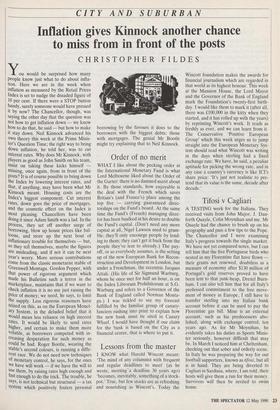CITY AND SUBURBAN
Inflation gives Kinnock another chance to miss from in front of the posts
CHRISTOPHER FILDES
You would be surprised how many people know just what to do about infla- tion. Here we are in the week when inflation as measured by the Retail Prices Index is set to nudge the dreaded figure of 10 per cent. If there were a STOP button handy, surely someone would have pressed it by now? The Chancellor, though, was saying the other day that the question was not how to get inflation down — we know how to do that, he said — but how to make It stay down. Neil Kinnock advanced his own theory this week at the Prime Minis- ter's Question Time; the right way to bring down inflation, he told her, was to cut interest rates. Why does Mr Kinnock, with players as good as John Smith on his team, insist on taking these kicks himself missing, once again, from in front of the posts? It is of course possible to bring down the Index by lowering interest rates, and that, if anything, may have been what Mr Kinnock meant. Housing costs are the Index's biggest component. Cut interest rates, down goes the price of mortgages, and the cosmetic effect on the Index is most pleasing. Chancellors have been doing it since Adam Smith was a lad. In the process, they set off another surge of borrowing, blow up house prices like bal- loons, and store up the next bout of Inflationary trouble for themselves — but, so they tell themselves, maybe the figures are misleading, and if not it can be next year's worry. More serious contributions come from the classic monetarist stable of Greenwell Montagu. Gordon Pepper, with that power of rigorous argument which made his Bulletins such a terror in the marketplace, maintains that if we want to check inflation it is no use just raising the price of money; we need, he says, to limit the supply. Less rigorous reasoners have seized on this, as on the European Monet- ary System, in the deluded belief that it would mean less reliance on high interest rates. It would be likely to send rates higher, and certain to make them more volatile, as borrowers competed with in- creasing desperation for such money as could be had. Roger Bootle, wearing the stable's second colours, is running a diffe- rent race. We do not need new techniques of monetary control, he says, for the ones we have will work — if we have the will to use them, by raising rates high enough and fast enough to do the trick. The trouble, he says, is not technical but structural — a tax system which positively fosters personal borrowing by the favours it does to the borrowers with the biggest debts: those with mortgages. The genial Mr Bootle might try explaining that to Neil Kinnock.




























































 Previous page
Previous page